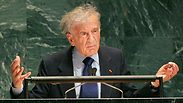
Elie Wiesel remains loyal to his commitment not to say a bad word about Israel
צילום: רויטרס
Elie Wiesel: Why should I be president?
Nobel Peace Prize laureate reveals to Nahum Barnea how Prime Minister Netanyahu pressured him to become Israel's new president and why he turned down the offer.
Prime Minister Benjamin Netanyahu telephoned Eli Wiesel in New York three times. "You will be the president of the State of Israel," Netanyahu said. "I have finalized it with everyone. Just say yes."
"I'll consider it," the Nobel Peace Prize laureate replied. His "I'll consider it" was the type of "I'll consider it" that polite people say when they intend on saying no. One doesn't say no to a prime minister. One say, "Thank you, it's a great honor, I'm excited, I'll consult people." The tone takes care of the rest. But Netanyahu wouldn't let go.
Wiesel is an amazing person. At the age of 86 he writes, lectures, fosters a foundation with his wife Marion which funds, among other things, two institutions for children in the southern Israeli cities of Ashkelon and Kiryat Malachi. In the time he has left he does quite a lot, verbally and in writing, for the Jewish people and the State of Israel.
He lives in New York. He has never resided in Israel, apart from his short visits here, usually during the holidays. He never asked to become a citizen. He always thought that his decision to live far away carries a price: He avoids lecturing the Israelis on how to live and who to elect, and he strictly avoids criticizing Israel even when he doesn't approve of its actions.
I have interviewed Wiesel several times. In one of those times we talked about his mastery of languages. He writes his books in French and his articles in English. "Your Hebrew is Fluent," I told him, "without a hint of an accent." He said he had brought the Hebrew from his family home, enriched it during the years he worked as Yedioth Ahronoth's correspondent in Paris and New York, and preserves it by reading books and newspapers in Hebrew.
"You sound like an Israeli," I told him. "You won't get away with it without being punished."
This time the punishment arrived in the form of a huge amount of pressure exerted by Netanyahu and the people Netanyahu sent over to him.
"Why on earth should I be president?" he told me on Wednesday. "It's not for me."
I caught up with him on the phone, at the office of his foundation in New York. "What, did it occur to you that I would say yes?" he asked me. He was amused.
I told him that on Tuesday night Netanyahu had declared a Wiesel alert. Until close to midnight, the deadline for closing the list of presidential candidates, he begged the ministers of the Likud, Yisrael Beiteinu and Bayit Yehudi not to endorse Reuven Rivlin, because Wiesel had said yes. Knesset Speaker Yuli Edelstein, Netanyahu claimed, had agreed to postpone the deadline by one day. Within 24 hours he would get Wiesel an Israeli citizenship and Wiesel would be everyone's candidate.
When midnight arrived but the positive answer from New York did not, everyone felt deceived. Wiesel refused, Edelstein did not postpone the deadline and the whole move was revealed as a false pretense, a drowning man clutching at a straw.
"He telephoned me three times," Wiesel said. "When he failed to receive a favorable answer, he pressured me through mutual friends. The pressure was heavy, you have no idea how heavy, but I know how to face pressure. One of those who pressed me said, 'Your father in Heaven will see you being elected as the president of the State of Israel. Don’t you want to make him proud?"
"It went that far," I said.
"That far," he said.
We laughed.
"What did you say to all those who pressed you," I asked.
"I said, 'Leave me alone. I write books. I wasn't meant to do that.'"
"Weren't you glad?" I asked. "Nevertheless, it's a great compliment."
"I was glad to have so many friends who want me," he said.
"What arguments did Netanyahu use to try to convince you?" I asked.
"He said, 'It's important for Israel, it's important for the Jewish people,'" Wiesel said.
"That's interesting," I said, "because only a week ago he said that the presidency was unnecessary and should be canceled. How is it possible that what was unnecessary last week became important this week?"
Wiesel remained silent, loyal to his commitment not to say a bad word about Israelis wherever they are. The man is too positive. He is unsuitable to be president – at least in Israel.










